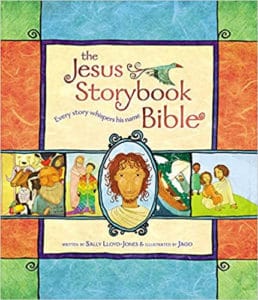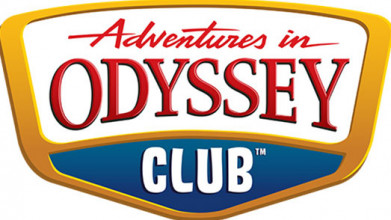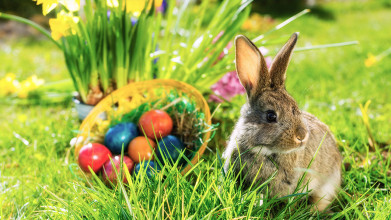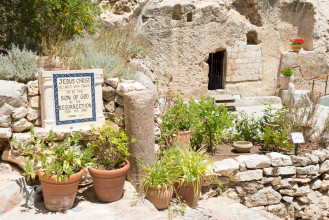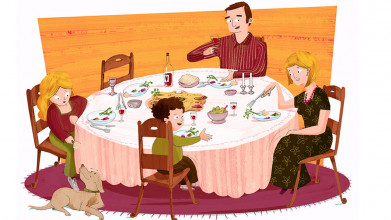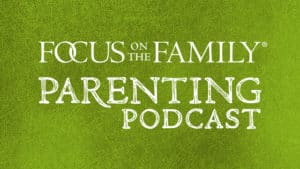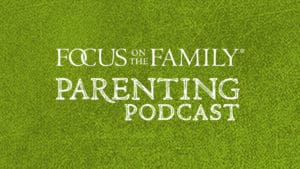Teaser:
Child 1: Well, the best part of Easter – that we find the eggs and that they have candy in them.
Child 2: We celebrate when Jesus, um, dies on the cross and then the angels told those ladies that, “He’s not here. He’s arisen.” They were, like, so happy.
Child 3: The Easter bunny is fake! He doesn’t do nothing. And I don’t believe in him.
End of Teaser
John Fuller: Oh, that child just called out the Easter Bunny and we might have some parents and kids upset about that. I’m sorry. This is Focus on the Family with Focus president and author, Jim Daly. I’m John Fuller, and today a look at the truths and the myths surrounding Easter.
Jim Daly: Well, John, Easter Sunday is coming up next weekend, and things are probably going to be a lot different than what we normally do to celebrate this wonderful time of our Lord’s resurrection. But we’re going to make the best of it. I mean, certainly, through Focus on the Family broadcasts and podcasts and other means, I hope people are celebrating on this great weekend.
John: Yeah, and certainly there are a lot of virtual opportunities for us. I was talking to Deena last night. She said that a number of her girlfriends have been doing a lot of online sermons and preachers from current days and some past classics. So, there are some creative ways we can worship and pray and really put God first at this special time.
Jim: Exactly. Without Christ, we have no hope. He is our hope everybody. But a lot of children and adults don’t associate Easter with Jesus. They may think of candy and Easter Bunnies and Easter egg hunts, but they have forgotten what the true meaning of Easter is all about. We’re coming back to an interesting interview we did with Phil Vischer, one of the creators of VeggieTales. He’s such a creative guy, producing wonderful spiritual tools for kids. At the time of the interview, Dr. Juli Slattery, our good friend, was in-studio with us and you’ll hear her voice in the interview as well as we talk about the significance of Easter – the death and resurrection of Jesus Christ.
John: And as you said, Jim, Phil is extremely creative. He does a masterful job of bringing clarity to truth. And he’s going to help us with some great advice for parents as you help your children understand the importance of Jesus’ death and resurrection. I think you’re going to find this conversation to be pretty engaging and entertaining as well. Let’s go ahead and jump into the discussion on today’s episode of Focus on the Family.
Jim: Phil, it’s great to have you here at Focus on the Family.
Phil Vischer: Thank you. It’s great to be here.
Jim: (Laughing).
Phil: Glad I can join ya.
Jim: And Phil’s saying, “Now why am I here?”
Phil: (Laughter).
Jim: Here’s why you’re here, Phil, because you have done such a brilliant job teaching kids Biblical truth in a way that kids understand it. I think it’s ’cause you have the mind of a child.
(Laughter)
Phil: Why – why –
Jim: And I mean that in the best way.
Phil: – thank you, Jim.
John: A compliment that.
Jim: Yes, that’s a compliment.
John: That’s a compliment.
Phil: Coming from you, that’s a compliment.
(Laughter)
Jim: But, um, you know, when it comes to Easter, you’re also very serious about things of the faith and you want to convey these things to kids. And so, we thought it would be great to hear your creative heart, your creative genius and how we can actually reach kids and help them to discern between the myths of the Easter Bunny and all those things.
Phil: Right.
Jim: And the truth and the power of Scripture. Uh, Phil, let’s start with a common question we get from our own listeners here at Focus on the Family. Here’s an example from a mom who writes, “I want to start teaching my 2 and 4-year-old girls to understand what Easter is all about. And I’m afraid right now, all they know is the Easter Bunny and I feel an urgency to teach them the true meaning of what we’re celebrating.
Phil: Right, right.
Jim: What do you think? How do you respond?
Phil: Well, I think – uh, we just did a – a Christmas special, you know, with What’s in the Bible? And the purpose was really to help parents unpack the secular from the sacred, so they could understand it themselves. Because when parents don’t understand it, you know, what’s a Christmas tree and does it have anything to do with Jesus? It’s really hard to answer those questions from your kids. So, for that question, don’t ignore where they’re starting. You know, don’t say, “Duh, duh, nobody. Nobody. No.” You know, “Forget about the bunny.” No, just start with the bunny. Say, “Okay, well, why is the bunny associated with Easter? Does anybody know?”
Jim: No, you’ve don – Tell us.
(Laughter)
Jim: Do you know, John? Juli?
John: I – I’m hoping Phil is going to tell us here.
Jim: Okay, good. Okay.
Phil: Let’s dive – because it was a fertility symbol, because bunnies reproduce like mad, so they were a symbol for new life.
Jim and Juli: Hm.
Phil: Okay? A bunny is – every spring, rabbits have lots of little bunnies. It’s one of the signs of spring. And because of that, it was a symbol for new life, and this is going way back, even before Jesus, you know. Way back in history people associated rabbits with new life. So, when Easter started developing and spread around, you know, through the Christian world, that was one of the symbols that came. Eggs were the same thing. That’s another thing, Easter eggs. You know, so kids are decorating eggs. Is there anything Christian about decorating eggs?
Jim: (Laughing).
Phil: Actually, yes there is. Um, it was a custom, going way back. Okay, if you go way, way back, you’re tribal, okay? Before Rome, before you know, you’re in Northern Europe. You need protein. So, every spring, you take your family out and you collect eggs. You hunt for eggs.
Jim: As a form of nutrition.
Phil: Because it’s a easy form of protein.
Jim: Hm.
Phil: Okay, now that developed over the years until they set up a special day where kids would go out and collect eggs, just by themselves, would go out and hunt for eggs as a source of protein. And in certain parts of the world, eggs are multicolored. You know, they come in lots of different colors and kids would try to find the most colorful eggs they could find and bring them back. In other parts of the world, eggs were very bland and didn’t come in fun colors, so they started coloring them. The grownups would start coloring eggs for their kids and then hiding them for them to find, so they could find these multicolored eggs.
Jim: Now what year was that? This isn’t – we’re not talking 1950s.
Phil: This is pre-Christian.
(Laughter)
Phil: No. This is – this would be, um, 1st Century, 2nd Century, 3rd Century in Northern Europe.
Jim: Ah.
Phil: So, it’s before Christianity reached Northern Europe. Then what happened, is Christian missionaries brought Christianity to Northern Europe. They started taking those customs as they converted to Christianity and saying, “Hey, is there a way to use this to celebrate Jesus?” And in the Middle Ages, they started dyeing eggs red to represent Jesus’ blood, so that kids would find red eggs and it would remind them of what Jesus has done for us. This goes back. You probably know Resurrection Eggs.
Jim: Oh, yeah.
Phil: You know, which are in Christian bookstores everywhere and have been…
Jim: Right.
Phil: …Fairly popular for about the last 20 years or so. And you think, “Wow! Well, that’s new. Using eggs, you know, which is secular, to try to teach the Christian story.” Actually, it’s not new at all. In the Middle Ages, they started dyeing the eggs red, so they could talk about what Jesus had done and then actually started – and this was in the church in the Middle Ages – they would paint the key figures from the, uh, Easter story onto eggs.
Jim: Hm.
Phil: So, here’s Mary. Here’s Joseph. Here’s Jesus. They would paint them all on eggs and they got to the point where they could tell the whole story of Jesus’ life with eggs that had been painted with these little scenes.
Jim: So, for parents, you know, so often, uh, here at Focus on the Family, we’ll get that question, where parents – Christian parents are concerned about meshing what is perceived to be, uh, just a secular orientation. You’re…
Phil: Right.
Jim: …Saying, it’s okay. Am I hearing you correctly? It’s okay to engage the story of the Easter eggs.
Phil: Yes. Start where your kids are. You know, it’s the same thing with Santa Claus. Kids know about Santa Claus. They can’t help not knowing about Santa Claus. So, start with Santa Claus and say, “Who really was he?” And that’s why we tell the whole story of Saint Nicholas, going back through church history ’cause when you know the Christian underpinnings of many of these traditions, it makes sense.
Juli Slattery: Hm. Now, Phil, I think one of the things that keeps parents from talking about the true meaning of Easter is that it’s kind of a gory story. It’s not like Christmas, where we can talk about this little baby in a manger…
Phil: Right.
Juli: …And a 3 or 4-year-old can understand that. We’re talking…
Phil: Right.
Juli: …About torture. We’re talking about death and blood…
Phil: Right.
Juli: …And, uh, raising from the dead. Things that we’re maybe afraid that our kids can’t understand.
Phil: Right. It makes it tempting to jump to the bunny.
(Laughter)
Juli: It does. I…
Phil: Kind of its – and so….
Juli: …I can remember when my nephew was maybe 4 or 5 and my mom was trying to teach him about Easter. And she talked about Jesus being nailed on the cross and tried to use kids’ terminology. And my nephew runs in the house and he goes, “I know what Easter’s about. Jesus got screwed up. And so – and my sister was like, “What did you tell my son?”
Jim: (Laughter) Where did that come from?
Juli: But he didn’t quite understand.
Phil: Yeah, yeah. I mean, you have to know where your kids are. You know, ’cause there may be a 2-year-old who is ready for one lesson that a 4-year-old in another family may not be ready for. So, parents knowing their kids is really vital. And then you just simplify. You have to simplify a story. You know, and we do. We teach our kids about the police, you know. If you have a 4-year-old, you teach the police very simplistically. They are guys to help you. Okay, you’re never gonna say, “Oh, but occasionally, there are crooked ones. There are bad cops. And occasionally, you know, we have to investigate the police force, because there’s bribery.” No, that’s not an appropriate message for a 4-year-old. A 4-year-old needs it simplified. Is it 100% accurate what you tell a 4-year-old about the police? Not necessarily, but that’s okay. You add more information as they get older. And so, you have to simplify the stories from the Bible to tell them to a very young child. You know, “Jesus died.” Why did He die? He let Himself die. And some people get kinda nutty with the details, you know. And here’s what a crucifixion was like in Rome. Like, wait a minute! You know, junior-highers? Yes. Uh, 5-year-olds? No. Jesus died, so you wouldn’t have to. He paid – you – you can put it in simple terms. He paid a debt that you owed. You did – (Laughing) We all do something wrong. We do something wrong. We can’t pay that debt, because God is so perfect. And this is what we try to teach in What’s in the Bible? You know, through animation and through lots of techniques. We tell a story to teach what redemption means, ’cause redemption is a very hard concept to explain to a child. And so…
Jim: Or an adult.
Phil: Or (laughter) –
Jim: I mean, really.
Phil: Or an adult.
Juli: It’s true.
Phil: So, we have a little animated short that says, “Okay, there was a little boy and he’s with his sister in a rowboat in the middle of the ocean and he’s, uh, bored, so he’s throwing peanuts into the ocean and he hits a green sea turtle with a peanut. And green sea turtles are protected. You’re not supposed to hit a green sea turtle with a peanut. So, the sea police come along…”
Jim: (Laughter).
Phil: “…And they give him a $50 fine and they throw him in prison until he can pay the $50 fine. Well, he doesn’t have 50 bucks. He just has the bag of peanuts. So, his sister goes home, and she breaks her piggy bank and she’s got $20 bucks. And then she has a bake sale and she’s got $10 more bucks. And then she plays her violin on the sidewalk with a hat and she gets $10 more bucks. And she finally gets $50 bucks and she gets back in her boat and she rows back out to the sea police and she pays her brother’s debt so he can get out of the sea prison and he can come back home. She redeemed him. That’s what redemption is. It’s someone else paying your debt.” Start with the concept, not with the details of, well, they nailed through the wrists and the – like, well, that doesn’t help me at all. What helps me is, I owe a debt that I can’t pay, and Jesus paid the debt. And as kids ask for more details, yeah, you can give them the details that they’re ready for. But that’s all – what they need to know. Easter is our celebration of Jesus paying our debt, so we can be with God. That’s what they need to know.
Jim: Phil, as you describe that, it’s so brilliant, because so many parents, we stress out about trying to get the detail there, because we panic that our kids aren’t gonna – they’re not gonna get it and they need to get it quickly. Even for an 8-year-old, 9-year-old, there’s certain content related to the death and resurrection that may be overwhelming for them.
Phil: And – and – and doesn’t help.
Jim: And doesn’t help. So, for the parents that are stressing out about this, specifically, give me a tool. You’re saying to me, just slow down a little. Be humorous even. Uh, that can be hard for some parents.
Phil: If – if it’s in your nature.
(Laughter)
John: Don’t force it.
(Laughter)
John: Don’t force being funny. Yeah.
Phil: Forced humor is – can be counterproductive.
(Laughter)
Juli: Sounds like you have an experience with that.
(Laughter)
Jim: Now are you also a marriage counselor?
Phil: Ah, I play one on TV. No.
Jim: But you know what I’m saying. Some parents…
Phil: Yes.
Jim: …We can stress out that we’ve gotta – I had a note here at Focus, a letter that came from a sincere mom, who said, “I’m very troubled. My 7-year-old has not accepted Christ yet and I don’t know what to do.”
Phil: Yeah.
Jim: And it was actually – you could see. I met that person later. It was driving a wedge in their relationship because she…
Phil: Wow.
Jim: …Was so, uh, bent on the fact that she needed her daughter at 7 to confess Christ, that she was probably pushing her daughter away.
John: Hm.
Phil: Yeah. You can’t generate emotions in kids that they aren’t ready to feel. You know, and trying to get a 4-year-old to feel somber (laughter) is a profoundly unproductive task, you know. And unfortunately, you know, Holy Week is a week, you’re supposed to feel somber. Good Friday, you’re supposed to feel somber. Four-year-olds, 5-year-olds, that’s not really in their emotional lexicon yet. It’s not in their bag of emotions that they can pull out. Even if you play them the right song, it won’t necessarily generate that emotion. So, it’s important to say, “Okay, well, what emotion is my child capable of feeling?” Well, gratitude.
Jim: Hm.
Phil: You know, you had a – a debt you couldn’t pay, and Jesus paid it for you. And that’s what we’re celebrating. So, you focus on the celebration. Um, to move away from the secular view of Easter, I think one important point is to celebrate the whole week. Celebrate Holy Week. You know, because if it’s just about one day and the one day is called Easter, well, that’s exactly what the world celebrates. Celebrating Holy Week is something that Christians do specifically that is unique.
John: Hm. Our guest today on Focus on the Family is Phil Vischer. Our hosts are Jim Daly and Dr. Juli Slattery. Phil, flesh that out a bit. What does that mean for us to celebrate all of Holy Week? Let’s say I have a couple of preschoolers or a preschooler and a gradeschooler. What can I do to observe Holy Week?
Phil: Well, a lot – we used to have, you know, if you go back a couple of hundred years and in some church traditions, you have a very rigid church calendar. You know, so you had Lent. You have 40 days of Lent leading up to Holy Week. So, the whole year – I mean, we’ve kind of, you know, in particularly in the Evangelical world, we’ve made Christmas like the Super Bowl of religious holidays. You know, we love Christmas, primarily ’cause we love all the stuff that goes with it. We have to remember at times, that the early church didn’t celebrate Christmas…
Jim: Right.
Phil: …’Cause they thought the birth of Jesus was more or less irrelevant to the death and resurrection of Jesus.
Jim: Right.
Phil: You know, the church calendar was structured around Easter. Easter is the Super Bowl of Christian holidays, not Christmas. So, I think the first step is to put Christmas back in its place and say, “Hey, Jesus was born. Isn’t that wonderful? What does that point us towards?” You know, it – it – with VeggieTales, the last two films I produced, um, were A Star of Christmas and An Easter Carol and they were companion pieces that went together, because you can’t tell one end of the story without the other end of the story. So, simply starting kids with the notion that Christmas: what does this point towards? It points towards Easter. Now you’re thinking of Easter all through the year, you know, as you get into Lent. And you may want to introduce the tradition of Lent, although kids fasting, you know, and being somber, again isn’t necessarily helpful. But just – this is what the church did at this time of year. And then we get Palm Sunday. And now we’re in Holy Week. You know, let’s talk about what happened during this week for Jesus. And there’s story there and kids respond to story more than graphic details. You know, graphic details are not story. There’s a shock factor for high school kids that are jaded and need to be woken up a little bit. And that’s – you know, there’s a place there. But young kids want story. Tell me the story of Jesus and what happened in that last week, starting with Palm Sunday and His triumphal entry. You know, and then through the whole week with the trial and Pilate and all this amazing stuff, there’s a story to be told there, without going into details that are inappropriate for a young kid, but to say, we’re celebrating this whole week. Now when you get to the end of the week and eggs and bunnies show up, you can put those symbols in their place and say, “They represent the new life that Jesus had on Sunday morning.”
Jim: You know, Phil, with children, it’s so hard and of course, parents are busy and we’re not as creative as a creative person may be. And so, giving them handles on how to do this is so critical. When you look at it for your own kids, I mean, when you look at age 5, what do you really want them to understand? At age 10, what should they be grasping? At age 15, what are some of those lessons?
Phil: Right. Right.
Jim: Just to kind of stir our thinking as a parent.
Phil: I’m grasping that I’m not nearly as structured as you would like me to be.
Jim: (Laughter) No, I’m sure you’re not as a…
Phil: I’ll work on that.
Jim: …Creative person.
Phil: (Laughter).
Jim: But you know, when your kids were 5, what were you trying to do?
Phil: At 5, I think Resurrection Eggs are actually a really good tool, because you take something they enjoy, coloring eggs and the notion of eggs and bring the story of Jesus out of it. Uh, there are tools like that. There are also tools like The Jesus Storybook, you know, which is a version of the Bible that points to how Jesus is the subtext behind every story. Uh, it’s an amazing little Bible storybook, that’s become very popular. Those are the things you start with kids when they’re 5, tools that use things they like – picture books, eggs – to bring the story of Jesus out in a very kid-friendly way. When you’re 10, you’re ready to look at images of the cross, you know, most likely. Uh, at least as they would be portrayed, you know, in the Stations of the Cross, where you have paintings of the different scenes. So, you can actually start to feed ’em. A 5-year-old does not need to have their face rubbed in their own sinfulness. That’s not really appropriate, you know, for a 5-year-old, which is why we never really dealt with sin in VeggieTales ’cause it was meant for preschoolers. And the key message for preschoolers was, God made you special and He loves you very much. There is a God. He made you and He loves you. That’s where we start with preschoolers. As you get into grade school, as you get towards 10, we need to think, “Okay, why isn’t the world the way you would like it to be? Why isn’t school the way you would like it to be? Why are you having conflicts with your friends? Why does nothing seem to work the way you would like it to work?”
Jim: Have you been talking to my 10-year-old?
(Laughter)
Phil: Let’s talk about sin. And sin is something that is in all of us and ruins our relationships and makes everything harder and we can’t be with God, because He’s holy and we’re not. He’s perfect and we’re not. He’s got a standard that’s way up here and no matter how – what kind of gym shoes we have on, we can’t jump that high. We can’t meet God where He is. And that’s where you’re telling the Gospel. That’s where you’re presenting the Gospel. So, for 8, 9, 10-year-old, which is why with What’s in the Bible? which is geared for that age kids, we’re really hitting the Gospel.
Jim: Hm.
Phil: You know, it’s not – VeggieTales was, there is a God and He loves you.
Jim: And Phil, you talk about that 15-year-old, because so many parents, uh – the teen years are tough. The kids are starting to separate. They want to be their independent own person. And that mom or that dad is seeing perhaps even a drift in their spiritual development. They’re worried.
Phil: Right.
Jim: Uh, how can you encourage them to turn on those lights that you talked about…
Phil: Right.
Jim: …At that age when they’re getting a little more distant?
Phil: I think the biggest encouragement for those parents is that most kids will have some drift. You know, when you’re trying to figure out, how am I different than my parents, you’re gonna consider every option. You’re gonna consider spiritual issues. You’re gonna consider how you dress. You’re gonna consider all these things. Some kids won’t and that’s awesome, you know. I think at least two of my three kids won’t, but that’s more about their personality than it is about my genius parenting.
Jim: So, if they hear this…
(Laughter)
Jim: …They gotta figure out who the third kid is.
(Laughter)
Jim: I like that.
Phil: Two and a half of my seven kids…
(Laughter)
Phil: I’ll just make it up. I mean, they’ll think I’m talking about them.
Juli: Well, one thing that does come up with teens is the idea that they can really sniff out hypocrisy.Phil: Absolutely.
Juli: And, uh, when they see us celebrating Easter and oh, it’s Easter. We gotta go to church, even though we may not have gone for the last month and a half. We need to celebrate Jesus’ death and resurrection.
John: Hm.
Juli: But they don’t see any penetration of that into daily life.
Phil: Right.
Juli: It makes them skeptical.
Phil: Right.
Juli: And, uh, Easter is a time for us all to look at our faith. What does it really mean for you day to day?
Phil: Yeah, that’s a really good point. For me, I think the issue was – ’cause I felt like a terrible parent for most of my parenting. And it’s largely because my personality is passive. You know, I have a hard time organizing the family, getting them together. “I’m gonna do devotions. I’m gonna lead you in an amazing… You know, I’m gonna be the dad from the imaginary, you know, family of the 19 whatevers.”
(Laughter)
Jim: Yeah, right.
Phil: “I’m gonna be…” And I would try, and it was just so unnatural to me. It just wouldn’t work, and I felt like a failure. Until I realized what my kids – I was – my own spiritual life was developing. You know, particularly when I lost my company. I lost Big Idea Productions in bankruptcy and I had focused entirely on that as my identity. And it really forced me to just fall back to God and say, “I have nothing but You.” That was such a rich time for me. I didn’t know how to, like present that as curriculum for my kids though until I realized one day, I just need to externalize what I’m going through. I just need to talk about it.
Jim: With your kids.
Phil: With my kids. I need to expose them to the journey that God has me on and it will become real to them. You know, so I just need to talk more. I need to open it, ’cause I’m quiet and I’m introverted. So, I was having these amazing conversations with God, but not then saying, “Do you know what God just told me, kids? Do you know what I just sensed from God? Do you know what God taught me yesterday?” So, it was a conscious effort, not to say, you know, “Every Thursday night from 7 o’clock till 8 o’clock, we’re gonna have a family devotional time and I will be your leader.” Which is not me.
John: (Laughter).
Phil: It was me just on the moment, if I had a thought about God, if I’d learned something about God, if God had done something in my life, saying, “Hey, kids, guess what happened to me today.” And it’s that natural, you know, making it not a special, you know, “Uh-hm, all right, turn off American Idol. Dad says we have to have devotions.” You know, not that structure, but just a natural part of the day, where even while you’re watching American Idol, if you choose to watch American Idol, you can say, “Hey, you know what God taught me today?” and it doesn’t seem like a weird thing.
Jim: Right.
Phil: And it’s just, “Well, that’s Dad.” You know and they admire you. I mean, kids will not walk very far away if they’ve seen you walking honestly, you know, through their whole upbringing. They still may walk away. It’s still gonna happen, but you don’t go very far when you’ve seen an honest life changed by God.
Jim: Well, now you’re treading into some really troubled waters, because what you’re saying, Phil, is that we as the parents, have to live out our faith every day.
(Laughter)
Jim: I mean, that’s what you’re saying. And so, when you’re…
Phil: Yeah.
Jim: …Upset, when you’re angry or you’re really fighting between yourselves in your marriage, your kids feel that. Your kids know that.
Phil: Right.
Jim: And then you come along at this time of year and you say, “Let me tell you about Easter.”
Phil: Right.
Jim: And let me tell you how…
Phil: Right.
Jim: …Jesus died for you.
Phil: Now it’s time to talk about Jesus.
Jim: Yeah.
Phil: Well, why wasn’t last week time to talk about Jesus?
Jim: Right.
Phil: We don’t have a ton of specific Easter traditions, because I don’t focus on holidays. I’m – I’m not an event person. Ask my wife about anniversaries and birthdays. She’s not crazy about this part of me.
John: We’ll – we’ll do that in a separate program.
(Laughter)
Phil: Yeah, a separate program.
Jim: We’ll call and talk to her.
Phil: I tend not to focus on special occasions. I’m more interested in the day to day. And so, for me, it’s about how do I make Jesus visible on a day-to-day basis through my walk with Him? And it’s not about teaching abstract concepts. It’s about showing, what decisions do I have to make this week and how am I using my relationship with God to help me make those decisions and exposing that to my kids?
Jim: Living it out every day. We’ve talked a lot today, Phil, about the importance of Easter, how we express that to our kids. Do it in an age-appropriate way, but really talk about Easter every day. That’s what I’m hearing.
Phil: Yeah. Absolutely.
Jim: In a context that works.
Phil: Yeah. That’s one of the things I don’t like about in when we turn holidays into huge productions, is that it implies that all of this meaning is confined to a certain day of the year and we’re not living in it. You know, we need to be steeped in Easter. It’s – we’re in the soup of Easter, you know.
Jim: Right.
Phil: It needs to be flavoring us every day of the year. And then you come to the actual day and you say, “All right, let’s do those traditions that our church does.” And they’re different for different churches and that’s fine. Let’s do those traditions that our church does, or our family does, if we like to create our own traditions, not to learn the stuff for the first time, but to celebrate what we already know.
Jim: Hm.
Phil: You know, it’s like the Psalms. I’m just teaching the book of Psalms in What’s in the Bible? The book of Psalms is not to each us about God; it’s us reflecting back to God what we’ve already learned about Him from the rest of the Bible. That’s a key distinction that kids really need to understand. We don’t go to the Psalms to learn about God. We don’t go to Easter to learn about Jesus. We go to Easter to celebrate what we know already.
Jim: The reverence. Phil, it’s been great to have you here. Thank you for your energy, for your creativity, for your heart for kids. You’ve helped literally hundreds of thousands, if not millions of parents help express their faith to their children. And, uh, you’ve just done a great job of that. Thank you.
Phil: Well, thank you and happy Easter.
Jim: Happy Easter. (Chuckling)
John: What a great conversation with Phil Vischer on this episode of Focus on the Family about ways to help your children understand the true meaning of Easter.
Jim: Well, I think you can see why we wanted to go back and share this program with you, because Easter is the most important Christian observance of the entire year. And today, we wanted to paint the difference between the secular Easter and the true Easter – celebrating the death and resurrection of Jesus Christ. And may I also just say thank you. Thank you for supporting the ministry here at Focus on the Family. We have a very intentional strategy to reach children for Christ through Adventures in Odyssey, Clubhouse magazine, Clubhouse Jr. magazine and so much more. In fact, a young woman named Elizabeth said this to us, “Just a note to let you know how much your program affected my life as a child. You guys rock! Sometimes I think everything I learned about the Old Testament and history I learned from Adventures in Odyssey. Now I’m 22, and I still know various verses and studies only because of you guys. I just really appreciate all that you do.” Well, first of all, to Elizabeth, man, we do this for the Lord so it’s great that He kept that hidden in your heart for all these years. And it’s for people like Elizabeth – that little girl, that little boy somewhere – that we want to ask you to help consider supporting Focus on the Family to help produce more episodes of Adventures in Odyssey and the other great tools we have for children. If the help we’re providing touches your heart, I hope you’ll send a gift, and let me say thank you in advance for doing so.
John: And when you get in touch if you can make a donation of any amount, we’ll send a copy of that book that Phil mentioned, The Jesus Storybook Bible, by Sally Lloyd-Jones. And our number is 800, the letter A and the word FAMILY. 800-232-6459. Or stop by focusonthefamily.com/broadcast, where we have downloads and CDs of this program. On behalf of Jim Daly and the entire team, thanks for joining us today for Focus on the Family. We hope you’ll plan to be with us again next time as we once more help you and your family thrive in Christ.










